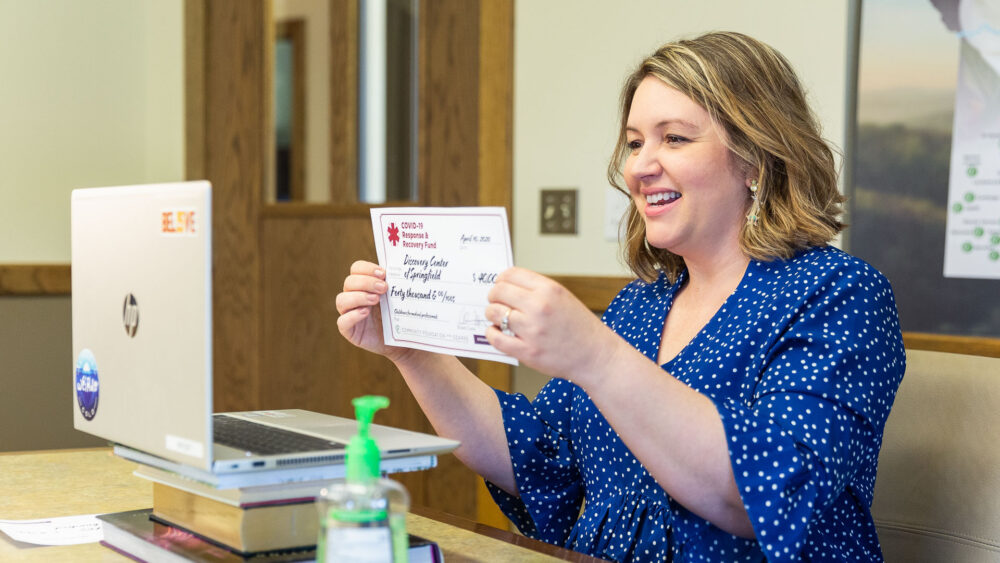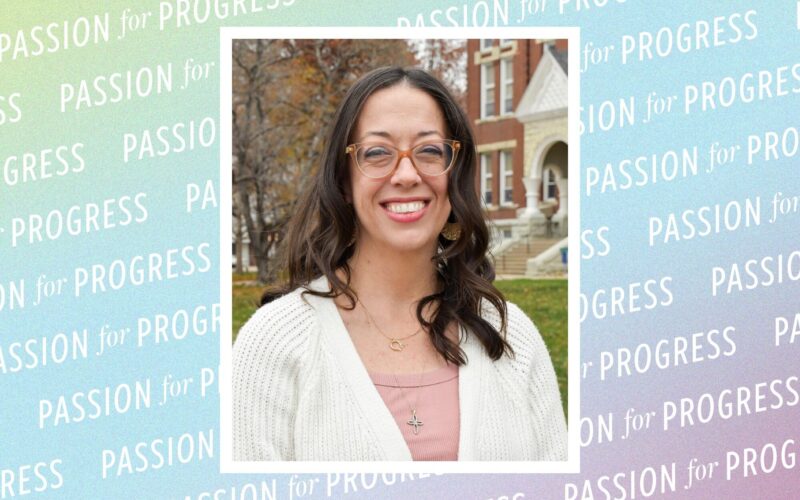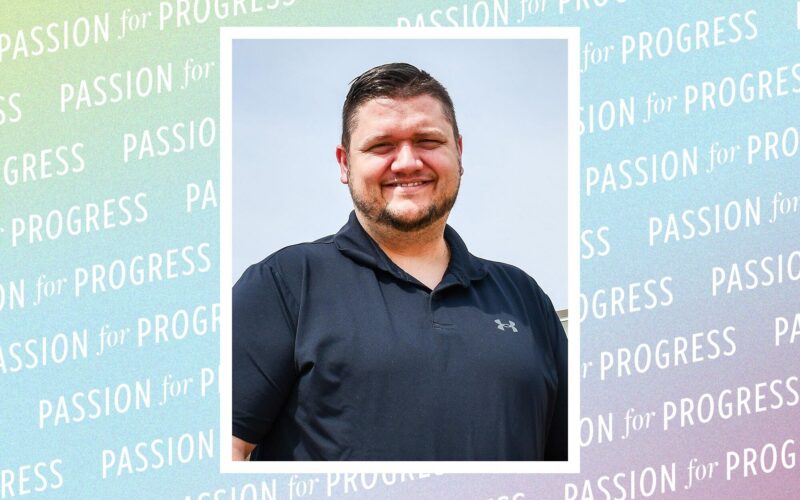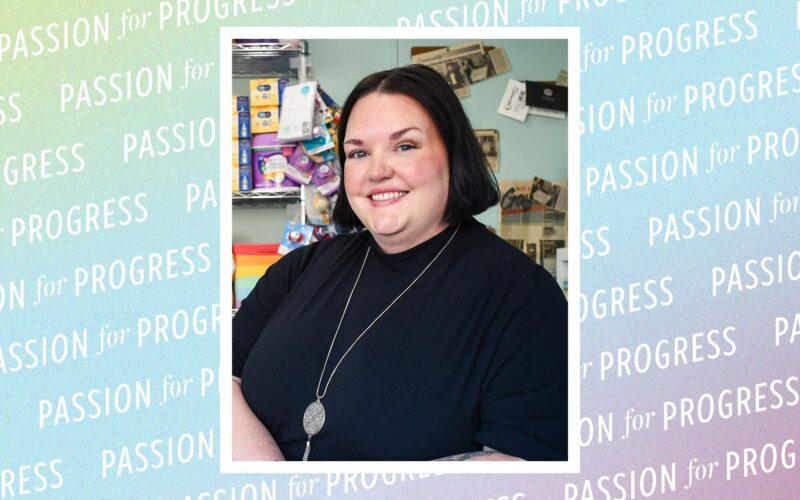COVID-19 Response & Recovery Fund
CFO programs evolve to meet immediate and emerging needs
Early on, the COVID-19 pandemic was frequently described as a slow-moving disaster. For the Community Foundation of the Ozarks, with its experience in disaster philanthropy, that characterization presented a familiar challenge, one that could be met by the generosity of donors and the flexibility of charitable resources. In some ways, that simple comparison held true: The short-term response phase, to address immediate needs that arose at the beginning of the pandemic, has been followed by ongoing, long-term recovery efforts.
But, as the pandemic has proven time and again, boiling things down to the simple and familiar is a mistake. There is no aftermath to dig out of, no homes or communities to rebuild. The impacts are felt globally, not in a single community or region. And two years on, the pandemic and its ripple effects continue to evolve, presenting new challenges to overcome. Fortunately, the grantmaking strategy of the CFO evolves as well. Over the last two years and into a third, the CFO continues to adapt existing programs, launch wholly new initiatives and work with its partners address the needs emerging from unchartered territory.
Immediate response
Initially, the CFO, like everyone else, was in response mode. On March 25, 2020, its first COVID-19 Response and Recovery Fund grant program opened, and the first grants from the fund were made nine days later. That first round — a total of $100,000 to nine agencies — and the rounds that followed for the next several months, supported agencies that were providing food, shelter and other critical needs to vulnerable populations.
For existing CFO grant programs, the sudden shift in need was met with quick flexibility. The 2020 Coover Regional grantmaking round — the CFO’s primary program for rural communities, in partnership with the Louis L. and Julia Dorothy Coover Charitable Foundation and Commerce Trust Company — had already closed for application when the coronavirus arrived in the Ozarks. As the selection committee reviewed applications, they prioritized agencies that could address the emerging needs of the pandemic. The annual arts program, administered in partnership with Springfield Regional Arts Council and the Jeannette L. Musgrave Foundation, shifted from project-based grants to operational support for arts agencies. Another program funded by the Coover Charitable Foundation dropped its typical focus on place-based education to instead meet the needs of rural schoolchildren through 1:1 challenge grants.
The abrupt shift to virtual meetings and remote work posed significant challenges to nonprofit agencies already stretched thin by the spike in demands for services — but philanthropy was there to respond. Pitt Technology Group, which holds a corporate-grantmaking fund with the CFO, worked with the CFO’s programs department to launch the Tech Access and Assistance Grant Program. After it opened in April 2020, the program provided more than $313,000 worth of labor and equipment to address information technology and wireless internet needs for 17 agencies in Springfield and Greene County.
In the following months, the CFO’s response grantmaking continued to showcase its nimbleness. After learning on the morning of July 23, 2020, that Springfield Public Schools would begin the 2020–21 school year with a hybrid of in-person and virtual learning, the CFO announced the SPS In-Person Learning Support Grant Program by day’s end, then presented $121,000 to seven nonprofits two weeks later.
Steps toward recovery
At the beginning of a new fiscal year in July 2020, the once weekly grant announcements now came monthly as the CFO shifted towards recovery grantmaking to provide crucial operational support to nonprofits across the region.
While government-funded grant opportunities became available through the CARES Act, certain agencies still struggled to find solid financial footing amidst continued uncertainties. The CFO opened the Respond Recover Rebuild Program-Related Investments program to provide a bridge to agencies until more stable funding sources were available. As part of the CFO’s impact investment portfolio, the $210,000 in low-interest loans to five arts and culture agencies will eventually be reinvested in other community projects.
To spread charitable resources across an even wider area and meet unique local recovery needs, the CFO again reshaped the annual Coover Regional program to provide $10,000 to 30 of its regional affiliate foundations. In turn, the affiliates redistributed the $300,000 — some bolstering their programs with additional funds from their community grantmaking endowments — to a total of 115 agencies.
The seismic change in the workforce and the heightened safety protocols in place created a troubling challenge for nonprofits that rely on volunteers. Through the COVID-19 Response and Recovery Fund, the CFO provided $88,200 in funding for staffing support to five Springfield-Greene County agencies in partnership with Penmac Staffing. The Volunteer Labor Supplement Grant Program allowed these agencies to continue to meet needs in the community until volunteers could safely return — but the obstacles in the workforce were a harbinger for unique recovery needs to come.
In another effort to help nonprofits navigate the complex $1.9 trillion American Rescue Plan Act, the CFO engaged retired local government leader Tim Smith to create a report and a regularly updated spreadsheet to highlight potential funding opportunities.

Bridget Dierks, vice president of programs for the CFO, presents a grant from the COVID-19 Response and Recovery Fund during a virtual event on April 10, 2020.
Advancing vaccination in the Ozarks
A distinct wrinkle in the comparison of the COVID-19 pandemic to natural disasters is the vaccine component — in a typical disaster recovery, there is no drug to prevent further effects of a flood, fire or tornado. Despite the high efficacy and widening availability of approved vaccines, Missouri’s vaccination rates lag behind the nation. To encourage community members in both Springfield and rural areas to consider vaccination, the CFO dedicated funds to two separate programs.
The Coover Regional Vaccination Initiative challenged the CFO’s regional affiliate foundations to lead vaccination efforts in their communities through a total of $60,000 in challenge grants. Affiliates opted in on behalf of a single county to increase the percentage of residents ages 12 and up that have received at least one dose of a COVID-19 vaccination. The CFO tracked data collected by the CDC for each county from July 26 to Sept. 20 to determine the winners.
Ultimately, the three affiliates representing Jasper County — the Joplin Regional Community Foundation, the Carthage Community Foundation and the Sarcoxie Community Foundation — split the top prize of $20,000 with an increase of 8.7%. During that timeframe, Joplin became the first city in Missouri to cross the 50% threshold for fully vaccinated residents.
The other winners for the CFO’s four regions were:
- The Cassville Community Foundation and Monett Area Community Foundation, representing Barry County;
- The Marshfield Area Community Foundation, representing Webster County;
- The Jacks Fork Community Foundation, representing Shannon County; and
- The Community Foundation of the Hermann Area, representing Gasconade County.
In Springfield, the CFO provided funds to Community Partnership of the Ozarks and the Springfield-Greene County Health Department to bolster vaccine incentives, largely provided by Missouri’s Department of Health and Senior Services. The local effort launched in August 2021 with “Greene for Vaccine,” which offered five $1,000 prize drawings to Greene County residents who initiated vaccination between Aug. 15 and Sept. 18. At the start of the campaign, the rate of eligible Greene County residents who were fully vaccinated stood at 43%; by the end, that rate had climbed to just under 50%.
In fall 2021, the CFO secured a $25,000 grant from the Coca-Cola Foundation to extend the incentive program. With school-aged children now eligible for vaccination, the CFO worked with the SGCHD and Springfield Public Schools to plan a series of mass vaccination events in an effort to vaccinate students and families in advance of the holiday season. More than 1,900 attended the two events, receiving gift cards provided by the state government and earning a chance to win family-friendly prizes like bikes, gaming systems, season passes to local attractions and tickets to Kansas City Chiefs games, all provided by the CFO.
More recently, the CFO provided five $500 gift cards to be drawn as prizes for those who received their first or second dose at pop-up clinics hosted at Springfield high schools in March. As of March 18, 53.9% of eligible Greene County residents were fully vaccinated against COVID-19.
Emerging needs
In July 2021, with the start of a new fiscal year, the CFO shifted the focus of its recovery grantmaking to address needs that emerged, both directly and indirectly, due to the pandemic. Though trillions of dollars from the federal government have been distributed to state governments to meet local needs, those funds have not always been readily available — but with more flexible charitable resources, the CFO was able to deploy the power of philanthropy to provide solutions.
A significant long-term impact of the pandemic has been the reshaping of the workforce and the exacerbation of existing issues that pose barriers to employment. To explore how philanthropy could play a role in helping people return to work, the CFO hosted a series of panel discussions with leaders from both the business and nonprofit sectors. The takeaways included three key themes that prevent people from looking for jobs or staying in jobs: workforce flexibility, access to child care and transportation barriers.
The CFO saw an opportunity to make a difference on the transportation front. Despite not budgeting for a transportation-related program, the CFO’s Board of Directors approved the use of $250,000 in reserve funds to seed the Let’s Go to Work Fund, which has since received support from David and Stacey O’Reilly, the O’Reilly Charity Golf Classic Fund, Bass Pro Shops, and other private donors. So far, $365,000 has been granted to 17 agencies to redistribute to individuals in need of transportation assistance.
“This is a once-in-a-generation opportunity to lift individuals and families economically, reduce poverty, and thereby enhance the quality of life for so many in our region if we can lower barriers to enter the workforce,” CFO President Brian Fogle said.
To address the issue of child care, the CFO worked with an anonymous donor with a passion for improving economic outcomes of residents in rural communities. In December, the Ozarks Early Childhood Support Grant Program granted $300,000 to 10 nonprofits to reduce barriers to quality child care so parents can return to work or maintain employment. Many of the grants helped improve pay for child care workers as wages for other jobs have risen significantly in the last year, while others helped agencies improve capacity or provide scholarships for children of low-income families.
“This program has the potential to provide so many levels of opportunity, not only for children to receive good quality care and education, but also for parents to be able to return to work knowing their children are being well cared for in a safe environment,” said CFO Board Chair Robin Morgan, of West Plains. “This will also give caregivers the opportunity to find good-paying jobs in child care.”
Beyond employment barriers, the CFO again reshaped a signature program to meet a unique need that arose early on in the pandemic and continued into 2022. When the coronavirus was first detected in the Ozarks, many senior centers closed for significant periods of time or shifted their services to drive-through or drop-in operations. That left centers — important social hubs in many communities — with deferred maintenance, new ways of providing services and other needs. The annual Coover Regional program was designed to meet these needs through the Senior Center Support Program. The CFO and Commerce Trust Company will present more than $261,000 in grants to recipients in April.
Knowing rural school districts also were grappling with pandemic challenges, the CFO surveyed rural educators to better understand the needs of their districts. With more than 400 responses, health care issues — particularly mental health — for students and staff were overwhelmingly identified as primary concerns. On March 11, the Coover/Rural Schools Partnership Grant Program opened for application with $80,000 available to address those needs for school districts in the RSP, the CFO’s network of rural school foundations. Recipients will be announced later this spring.
Ongoing innovation in grantmaking
With its experience in disaster philanthropy, the CFO understands the need for the long view in recovery. As the pandemic enters its third year, the CFO’s discretionary grantmaking will continue to evolve. While the likely shift of “pandemic” to an ongoing “endemic” suggests a return to relative normalcy, the long-lasting effects of the global health crisis will continue to require innovation in grantmaking. With the flexibility of unrestricted endowments, bolstered by past gifts from donors with remarkable foresight, and intentional efforts to develop new funding sources, the CFO is well poised to meet the community needs of the future.
By Aaron Scott, Director of Communications & Marketing


